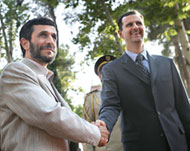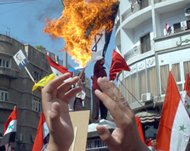Syria watches and waits
Thousands of protesters have thronged the streets of central Damascus to wave Syrian and Hezbollah flags and shout their support for Hassan Nasrallah, the Lebanese Shia group’s leader.

Monday’s state-organised protest is the first large-scale demonstration in Syria since Israeli and Hezbollah began attacking each other last Tuesday.
But elsewhere in the Syrian capital, there are few indications that the country could soon bear the brunt of Israel’s firepower.
Shops and cafes are as bustling as ever and the capital’s hotels still brim with thousands of Lebanese nationals and foreign tourists – including many who have fled from Beirut over the past three or four days.
Yet, with the conflict in Lebanon continuing to intensify, some speculate that the conflict might soon spill over into Syria, which supports Hezbollah and also hosts armed Palestinian groups including Hamas.
Andrew Tabler, a Damascus-based fellow at the Institute of Current World Affairs and a consultant editor of Syria Today magazine says that many Israelis want to see Syria punished for supporting Hezbollah and Hamas.
“Many people in Israel, as well as the US, believe that Syria acts as a conduit for weapons and supplies to reach Hezbollah,” he told Aljazeera.net
“This is one reason why Israel could decide to raise the pressure on Syria by striking localised infrastructure, such as power stations or key roads,” he said.
Regional war
 |
|
Iran’s President Ahmadinejad (L) and Bashar Al-Assad in 2005 |
Hezbollah’s close links with Iran have also raised fears that Israeli strikes against Lebanon could broaden into a much wider regional conflict.
Although Iran is internationally isolated, many think it could potentially create chaos in the region through other groups like the Islamic Jihad and pro-Iranian Shia militias in Iraq which it funds, trains and arms.
And experts say that Syria’s reach cannot be under-estimated either.
Although Syria’s military is under-funded, ill-equipped and badly-trained, Damascus can also upset US ambitions in the region, for instance by helping Arab Sunni jihadists to fight the US in Iraq.
“Israel would be making a grave strategic mistake if it attacked Syria,” Umran Zaaby, a lawyer and political analyst in Damascus told Aljazeera.net.
|
|
|
Al-Assad will support Lebanon , |
“Syria is not Lebanon. It is not a weak state and has allies in the region who can ensure that Israel, and the US, will find themselves in an even bigger dilemma than they do now.”
“Iran has the power to ensure that the American project in Iraq fails for good,” Zaaby said.
“It can also threaten to cut off energy supplies and send oil prices sky-high. Israel might have the strongest military power, but power is not just about the military”
Tough talk
The Syrian government has promised to defend itself against any Israeli attack.
“Any aggression against Syria will have a firm and direct response” |
“Any aggression against Syria will have a firm and direct response not limited in time or means,” said Mohsen Bilal, the Syrian minister of information, in an official statement on Sunday.
Bashar al-Assad, the Syrian president, meanwhile, said that he would put the “full resources” of his country at Lebanon’s disposal.
To win support around the Arab world, Syria has also tried to portray itself as the only defender of the Lebanese and Palestinians.
State-owned daily, Tishreen, has loudly criticised the Israeli attacks and what it termed a “shameful silence” from other Arab countries.
The newspaper’s editorial on Saturday said that Israel, with the backing of the US, was trying to “re-draw the regional map.”
Already, two Syrian workers have died in the Israeli bombing of Lebanon. They were caught in Israeli air strikes in the southern suburbs of Beirut, the Syrian state news agency SANA reported on Saturday.
Rumoured ultimatums
Israel has so far not publicly threatened Syria. However, the Arab media has reported that Israel has secretly issued an ultimatum to President Assad.
On Saturday, pan-Arab daily al-Hayat said that Israel, with US backing, had given Syria 72 hours to pressure Hezbollah into releasing two captured Israeli soldiers and ceasing cross-border attacks into northern Israel.
|
“We’re on alert now across the country and have to prepare for the worst” Abdul Rahman Attar, president of the Syrian Red Crescent |
US officials in Washington have neither confirmed nor denied the report.
But so far, Iran and Syria have kept a low-profile in the conflict, and are trying to avoid further escalation.
A rocket salvo fired at a Lebanese-Syrian border crossing on Saturday was initially believed to have strayed into Syrian territory. But within just minutes, both Israeli and Syrian military statements confirmed that only Lebanese targets had been hit.
Waiting game
Syrian officials might be treading carefully to avoid provoking an Israeli strike; but ordinary Syrians watching the conflict in neighbouring Lebanon find their emotions veering between concern and defiance.
In Saiyida Zainab, a predominantly Shia town and pilgrimage site, 25km south of Damascus, about 150 protesters gathered on Saturday night to wave yellow Hezbollah flags and banners, chanting their support.
|
|
|
Syrians burn an Israeli flag and |
And when news channels reported that Hezbollah had badly damaged an Israeli warship off the Lebanese coast on Saturday, small convoys of cars drove around the Syrian capital, honking horns and banging drums.
Others, though, are regarding the situation with more anxiety.
Abdul Rahman Attar, president of the Syrian Red Crescent organisation, told Aljazeera.net that “we’re on alert now across the country and have to prepare for the worst.”

